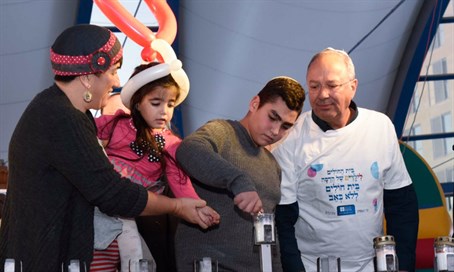
One of the candle lighters at the Hadassah Hanukkah party at the Jerusalem Cinemacity was Tahel Sofer.
In her car seat, Tahel a pretty three-year-old with big brown eyes, smooths the hem of her pink party dress saved for this Shabbat. Her long dark hair is pulled up artfully around the top of her head “like a princess.” Sitting next to her in the back seat of the Ford Focus are brothers Matan, nine, and Tair, 11, also showered and dressed for Shabbat, their cowlicks still damp. Their father, Uriel Sofer, is driving, and their mother, Sigal Sofer, is in the front passenger seat. The drive from their home in Nitzan – the town between Ashdod and Ashkelon populated by evacuated settlers from the Gaza Strip town of Neveh Dekalim – to Uriel’s sister’s home in Beit El in Samaria should take about an hour. They have almost reached their cousins in Beit El. Uriel and Sigal are talking quietly because the children in the back have fallen asleep. It’s one of those rare quiet moments where parents of seven can catch up.
Out of the corner of his left eye, Uriel sees two masked men. There is no way to get off the road. Uriel presses his foot on the gas, but the terrorists have already pitched their flaming bottles toward the car. Two thuds, shattering glass and a fireball in the car. The combined propulsion of the throw and the car’s forward moment smashes the back window . A Molotov cocktail – a bottle with a liquid, probably alcohol and oil with a rag stuffed in its spout – explodes when it hits Tahel’s car seat.The three children wake up shrieking.
“Should I stop?” shouts Uriel. “No, no, no,” insists Sigal. The image of those murdered when they have stopped their cars needs to be balanced against the fear that the car will blow up. Tahel’s pink dress is on fire. Sigal bats the flames with her hands, saying over and over “not again, not again.” Uriel reaches back to crush the fire with his hands. Down the road, they see soldiers on patrol. Uriel brakes. Sigal is out first, grabbing Tahel. She’s easy to pull out. The straps on the car seat have all melted. Lift your arms, she says. Sigal pulls the burning dress over her head, remembering how she cut the tag off this new dress and dressed her excited daughter earlier. Because her hair was done up, it didn’t catch fire.
The soldiers have ointments and blankets. The other children seem unhurt. Sigal’s hands are blistered. Never mind, she says. But the ambulances take them all to Jerusalem, blaring away as they race for medical care for Tahel.
This was not the family’s first brush with terrorism. Years before, Sigal and Uriel had lived in Neveh Dekalim and had built a home among the palm trees on the sandy land of Gush Katif in the Gaza Strip. Six thousand mortars fell on Neveh Dekalim. Sigal was wheeling her two oldest children in a stroller when terrorists attacked her, stabbing her in the chest and kicking her, as she tried to protect the children. “I screamed in a way I can’t even imagine, and guards came running and saved me,” she said. The stab marks show beneath her collar bone. After a long recovery, she tried to put the trauma behind her. In 2005, the government of Israel decided on a peace gesture of uprooting its own citizens from their homes in Gush Katif. Sigal and Uriel and their six children moved to Nitzan, with many of their former neighbors.
This Hannukah, Tahel and her siblings were there to light the candles on Tuesday at the Hadassah event at Cinemacity. She was wearing a pink dress. The store where she bought it had sent a replacement.
Once again, the family is healing. The blisters on Sigal’s hands are peeling. Tahel’s skin grafts are taking. “I know we had a brush with fire, but we’re taking Hanukkah to the place of miracles. We all could have been killed. Thank you, Hadassah, for giving us the best care, ever. Wishing you a Happy Hanukkah.”
By Barbara Sofer (No Relation)
See http://www.israelnationalnews.com/News/News.aspx/204598#.Vmh5kHmFPoo and http://www.timesofisrael.com/young-victims-of-terror-celebrate-hanukkah-in-Jerusalem/
